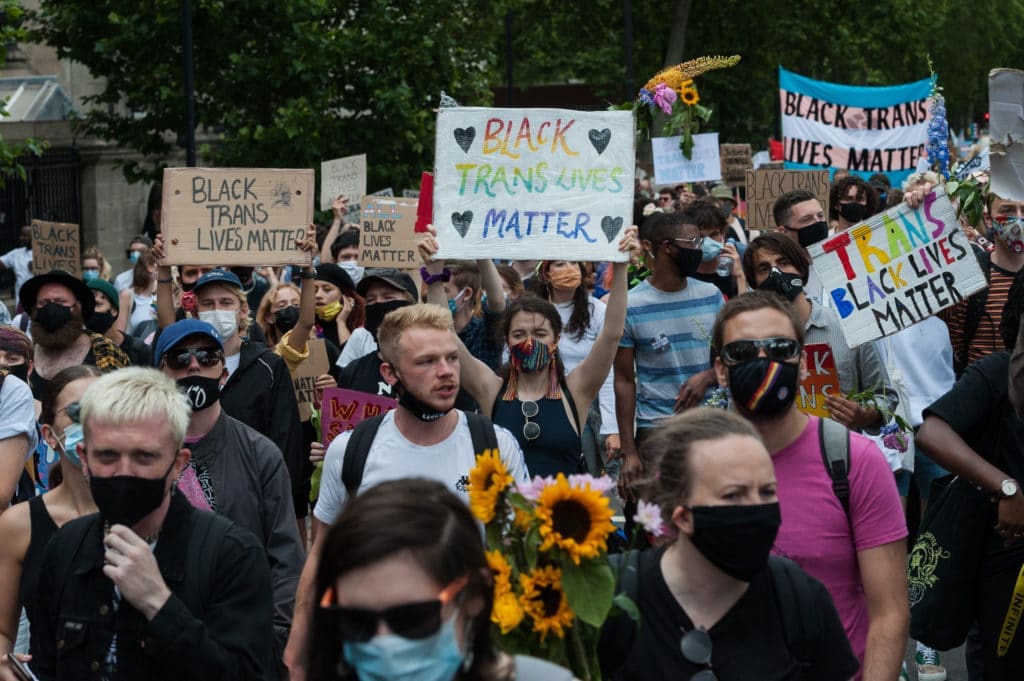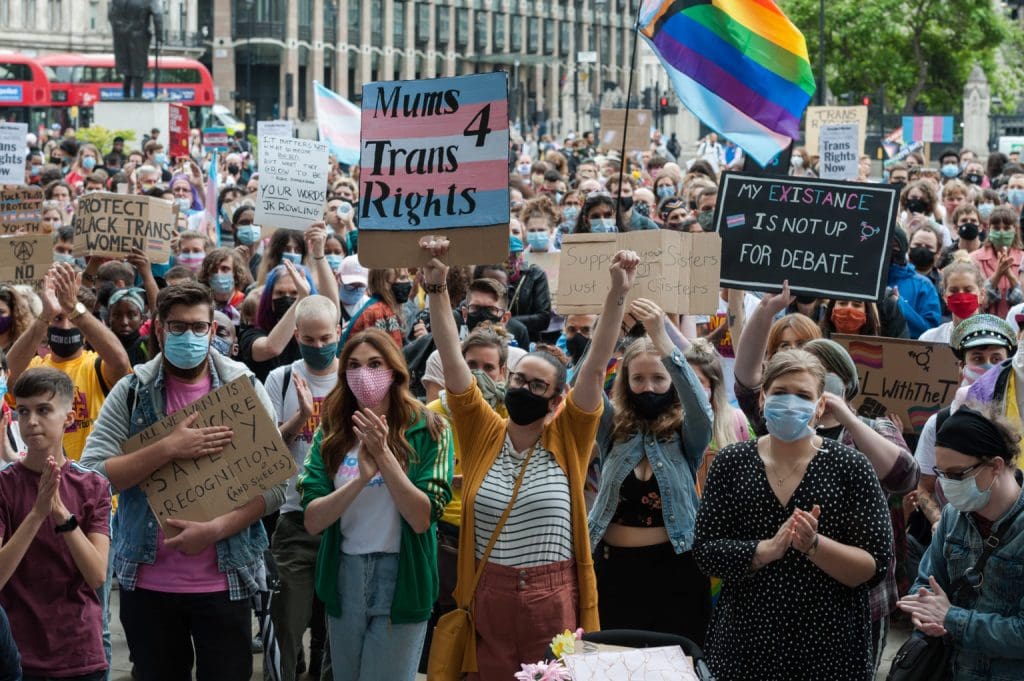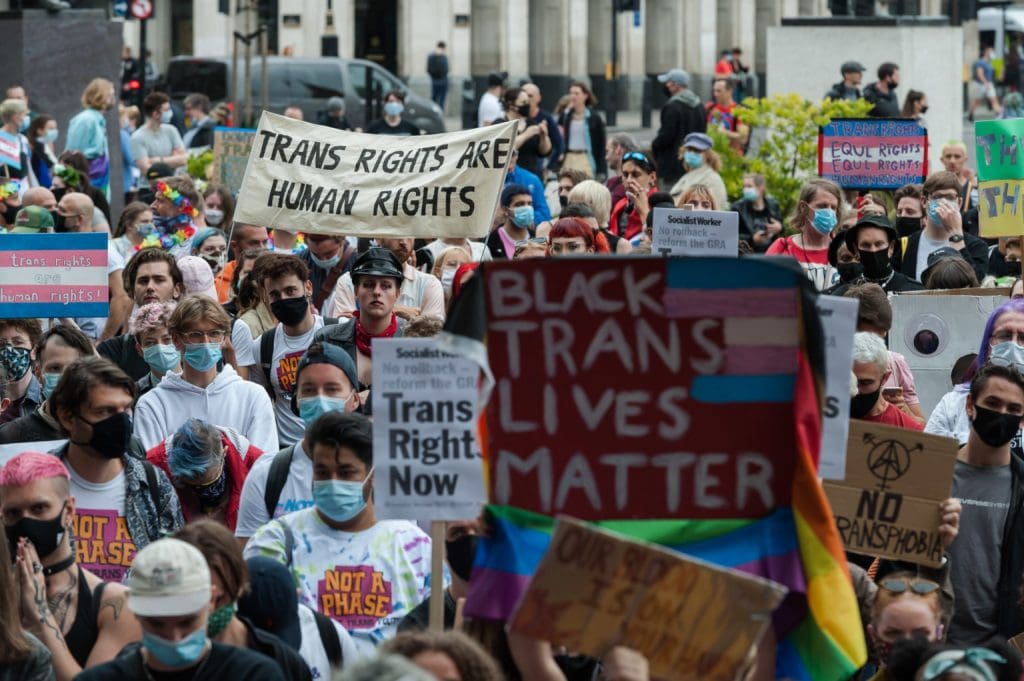LGBTQ+ issues Tory leadership candidates should really be focusing on
The UK is in the midst of a cost of living crisis, the NHS is crumbling, and hate crime is on the rise – yet Tory leadership candidates are wasting time with degrading comments about trans people.

Ever since the Tory leadership campaign kicked off, candidates have been asked questions about who can be called a woman and what genitals a woman should have by a media that is relentlessly cruel to queer people.
What’s worse is that some leadership hopefuls haven’t even needed a prompt from the media to punch down on the trans community – they’ve been happy to wade into the conversation all by themselves. Penny Mordaunt, once seen by many LGBTQ+ people as something of an ally, has repeatedly sought to distance herself from her past comments in support of trans rights.
While potential Tory leaders get caught up in tired, harmful debates, there are countless LGBTQ+ issues that urgently need addressing.
We take a look at some of the big issues facing LGBTQ+ people right now that potential Tory leaders should be focused on.
Conversion therapy needs to be banned
In 2018, Theresa May’s government promised to ban conversion therapy.
Four years on and no progress has been made. Legislation has been repeatedly kicked down the road ever since, and progress completely halted once May left Downing Street.
After Boris Johnson took over as prime minister, conversion therapy all but fell off the agenda completely. Both he and his minister for women and equalities Liz Truss repeatedly promised that legislation would be brought forward in due course, but nothing materialised.

In April 2022, news broke that Johnson would push ahead with a conversion therapy ban that excluded trans people. That decision was met with furious backlash from LGBTQ+ rights activists, with many condemning the government for leaving trans people at risk.
Now that Johnson’s time as prime minister has come to an end, it’s not entirely clear where the conversion therapy ban stands. Legislation has not yet been brought forward, meaning there’s still an opportunity for the next leader to bring trans people back into the fold.
However, judging by the tone of the leadership race so far, that seems unlikely. Several candidates have already used their platform to make dehumanising comments about trans people.
Studies on the subject have been clear – all LGBTQ+ people are at risk of being subjected to conversion therapy, and many trans people have been forced through the traumatising practice. Even more worrying is that several studies and surveys have shown that the risk of suicide increases exponentially after an LGBTQ+ person undergoes the debunked practice.
Instead of using the trans community as a punching bag, Tory leadership candidates should instead be talking about how they could make sure all LGBTQ+ people are protected from conversion therapy.
The Gender Recognition Act (GRA) urgently needs reform
When the UK’s Gender Recognition Act (GRA) came into law in 2004, it was a groundbreaking piece of legislation. Almost two decades on, it’s woefully out of date and is in desperate need of reform.
The GRA means that a person can legally change their gender – but the law underpinning the process requires trans people to jump through a number of challenging administrative hurdles before they can be legally recognised for who they really are.

Other countries in Europe have introduced self-identification, which streamlines the gender recognition process significantly – it means a person can self-declare their gender and receive a certificate confirming they are who they say they are. The situation is very different in the UK.
Under the terms of the GRA, a person seeking a Gender Recognition Certificate (GRC) must submit evidence to a panel of medical and legal experts for consideration. They must have a diagnosis of gender dysphoria or another mental health condition, a requirement that only serves to pathologise trans people.
There are other requirements too – applicants must be over the age of 18, they must be able to prove that they’ve been living in their correct gender for two years, and they must be able to demonstrate that they intend to live as that gender for the rest of their life.
To say the GRA is outdated is an understatement. The gender recognition process is unnecessarily complex and makes countless problematic assumptions about trans identities, from assuming that all trans people have gender dysphoria to the assumption that everyone has a binary gender identity. There is currently no legal recognition for anybody who doesn’t fit into male or female categories, such as non-binary or genderqueer people.
During Theresa May’s leadership, the equalities office – then fronted by Penny Mordaunt – launched a public consultation on GRA reform. The results showed that the public was broadly supportive of change, but Mordaunt’s successor Liz Truss opted to scrap reform anyway.

Now, Mordaunt is claiming she never supported self-ID to begin with – a claim that has been met with suspicion from LGBTQ+ and so-called “gender critical” activists alike.
Instead of pushing tired tropes about LGBTQ+ people, Tory leadership candidates could do with talking about ways they could improve life for trans people in the UK. The GRA is only aspect of that – legal gender recognition isn’t everything – but it would be a relatively straightforward reform that would lessen the burden on trans people.
Trans healthcare is in a state of crisis – and nobody seems interested in fixing it
Trans people, both minors and adults, can be referred to specialist clinics on the NHS that will offer them the care they need. The problem is that the waiting lists are enormous, meaning many trans and non-binary people are left languishing for years without access to affirming care.
One London clinic, for example, currently states on its website that it has more than 11,000 people on its waiting list. As of April, the clinic was offering appointments to people who had been referred in January 2018.
The system is on the brink of collapse – many trans people who have the means to do so are forced to go private because the waiting list for NHS clinics is simply too long.

The situation has become so bad that four trans people, alongside trans-led charity Gendered Intelligence, joined forces with the Good Law Project to bring a legal challenge against NHS England over the lengthy waiting times.
One of the claimants, Eva Echo, said being on the waiting list for specialised gender healthcare was “torture”.
Instead of making derogatory comments about what genitals trans people have, Tory leadership candidates could instead talk about ways to meaningfully improve the trans healthcare system.
Hate crime is on the rise
Anti-LGBTQ+ hate crime is on the rise all across the UK, but that doesn’t seem to be a concern for any of the Tory leadership candidates.
Data obtained by Vice World News in 2021 showed that the number of homophobic hate crimes had tripled and the number of transphobic hate crimes had quadrupled in the previous four years.
Worryingly, most hate crimes aren’t meaningfully resolved by police. In 2020, just 14 per cent of cases had a conclusive outcome such as a caution, charge, summons, penalty notice or community resolution.
Tory leadership candidates should abandon their tired attempts to capitalise on the “culture war” surrounding trans rights and should instead talk about ways to curb anti-LGBTQ+ hate crimes.
